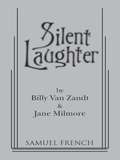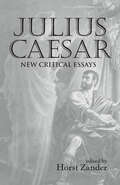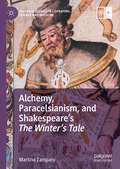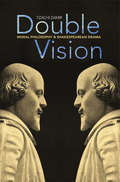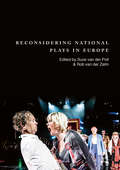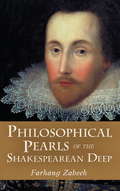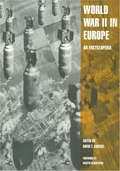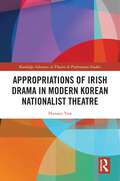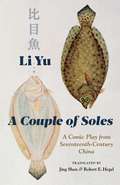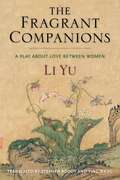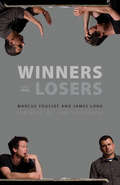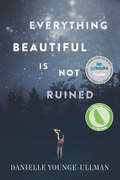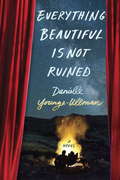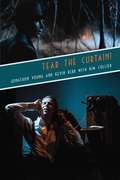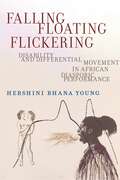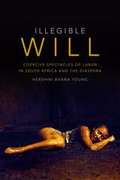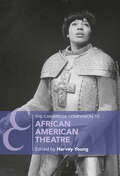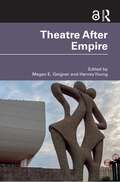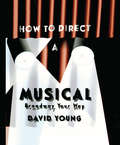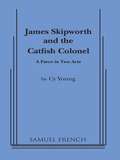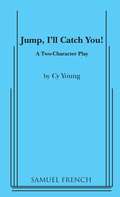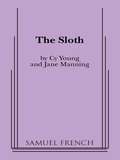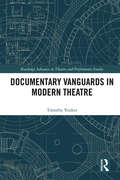- Table View
- List View
Silent Laughter
by Billy Van ZandtComedy \ 8m, 2f \ Various sets with projections \ New York audiences went wild for this gag-filled water sloshing, bed crashing, pie throwing craziness. Performed in black and white with title cards projected over the actors' heads, and a live theatre organ accompanying every doubletake, this comic tour de force stars a dashing hero who overcomes jail, poverty, World War I and a dastardly villain, Lionel Drippinwithit, to win the girl of his dreams. She is the heiress to the Thickwad Screw Factory, a firm that has been "Screwing the American Public since 1861." The biggest pie fight the theatre world has ever seen caps the silent action. More than a tribute to the slapstick antics of Chaplin, Keaton and Arbuckle - this is a reverential recreation of a bygone era. \ "Hilarious! . . . Surprises abound in the inspired physical comedy." - Village Voice
Julius Caesar: New Critical Essays (Shakespeare Criticism #Vol. 29)
by Horst ZanderThis book explores traditional approaches to the play, which includes an examination of the play in light of current history, in the context of Renaissance England, and in relation to Shakespeare's other Roman plays as well as structural examination of plot, language, character, and source material. Julius Caesar: Critical Essays also examines the current debates concerning the play in Marxist, psychoanalytic, deconstructive, queer, and gender contexts.
Alchemy, Paracelsianism, and Shakespeare’s The Winter’s Tale (Palgrave Studies in Literature, Science and Medicine)
by Martina ZamparoThis book explores the role of alchemy, Paracelsianism, and Hermetic philosophy in one of Shakespeare’s last plays, The Winter’s Tale. A perusal of the vast literary and iconographic repertory of Renaissance alchemy reveals that this late play is imbued with several topoi, myths, and emblematic symbols coming from coeval alchemical, Paracelsian, and Hermetic sources. It also discusses the alchemical significance of water and time in the play’s circular and regenerative pattern and the healing role of women. All the major symbols of alchemy are present in Shakespeare’s play: the intertwined serpents of the caduceus, the chemical wedding, the filius philosophorum, and the so-called rex chymicus. This book also provides an in-depth survey of late Renaissance alchemy, Paracelsian medicine, and Hermetic culture in the Elizabethan and Jacobean ages. Importantly, it contends that The Winter’s Tale, in symbolically retracing the healing pattern of the rota alchemica and in emphasising the Hermetic principles of unity and concord, glorifies King James’s conciliatory attitude.
Double Vision: Moral Philosophy and Shakespearean Drama
by Tzachi ZamirHamlet tells Horatio that there are more things in heaven and earth than are dreamt of in his philosophy. In Double Vision, philosopher and literary critic Tzachi Zamir argues that there are more things in Hamlet than are dreamt of--or at least conceded--by most philosophers. Making an original and persuasive case for the philosophical value of literature, Zamir suggests that certain important philosophical insights can be gained only through literature. But such insights cannot be reached if literature is deployed merely as an aesthetic sugaring of a conceptual pill. Philosophical knowledge is not opposed to, but is consonant with, the literariness of literature. By focusing on the experience of reading literature as literature and not philosophy, Zamir sets a theoretical framework for a philosophically oriented literary criticism that will appeal both to philosophers and literary critics. Double Vision is concerned with the philosophical understanding induced by the aesthetic experience of literature. Literary works can function as credible philosophical arguments--not ones in which claims are conclusively demonstrated, but in which claims are made plausible. Such claims, Zamir argues, are embedded within an experiential structure that is itself a crucial dimension of knowing. Developing an account of literature's relation to knowledge, morality, and rhetoric, and advancing philosophical-literary readings of Richard III, Macbeth, Romeo and Juliet, Othello, Antony and Cleopatra, Hamlet, and King Lear, Zamir shows how his approach can open up familiar texts in surprising and rewarding ways.
Reconsidering National Plays in Europe
by Rob Zalm Suze PollThis volume frames the concept of a national play. By analysing a number of European case studies, it addresses the following question: Which play could be regarded as a country's national play, and how does it represent its national identity? The chapters provide an in-depth look at plays in eight different countries: Germany (Die Räuber, Friedrich Schiller), Switzerland (Wilhelm Tell, Friedrich Schiller), Hungary (Bánk Bán, József Katona), Sweden (Gustav Vasa, August Strindberg), Norway (Peer Gynt, Henrik Ibsen), the Netherlands (The Good Hope, Herman Heijermans), France (Tartuffe, Molière), and Ireland. This collection is especially relevant at a time of socio-political flux, when national identity and the future of the nation state is being reconsidered.
Philosophical Pearls of the Shakespearean Deep
by Farhang ZabeehOffers many fresh insights that will give even longtime readers of Shakespeare a new appreciation of the great master.Scholars have long debated the extent of Shakespeare's education. Although his friend and admirer Ben Jonson said of him, "thou hadst small Latine and lesse Greek," Shakespeare's plays reveal a wide familiarity with literary and philosophical works from the Renaissance, the Middle Ages, and the classical age. Philosopher Farhang Zabeeh delves into this fascinating topic in this detailed study of the philosophical influences evident in Shakespeare's plays and sonnets. Readers will be surprised and delighted to discover in Shakespeare unmistakable echoes of Plato, Aristotle, Cicero, Dante, Montaigne, and other famous thinkers. In one chapter, the author makes a convincing case that one of the bard's most famous comic characters, John Falstaff, is a parody of Socrates. In other chapters, he demonstrates indirect references to Plato in Shakespearean passages concerning appearance versus reality, as well as the influence of Aristotle's ethics. Other common philosophical themes evident in the plays concern the nature of time, subjectivity versus objectivity, and political and moral values. This new work offers many fresh insights that will give even longtime readers of Shakespeare a new appreciation of the great master.
World War II in Europe: An Encyclopedia (Military History of the United States)
by David T. Zabecki Carl O. Schuster Paul J. Rose William H. Van HusenFirst Published in 1999. Routledge is an imprint of Taylor & Francis, an informa company.
Appropriations of Irish Drama in Modern Korean Nationalist Theatre (Routledge Advances in Theatre & Performance Studies)
by Hunam YunThis book investigates the translation field as a hybrid space for the competing claims between the colonisers and the colonised. By tracing the process of the importation and appropriation of Irish drama in colonial Korea, this study shows how the intervention of the competing agents – both the colonisers and the colonised – formulates the strategies of representation or empowerment in the rival claims of the translation field. This exploration will be of great interest to students and scholars of theatre and performance studies, translation studies, and Asian studies.
A Couple of Soles: A Comic Play from Seventeenth-Century China (Translations from the Asian Classics)
by Li YuA Couple of Soles is a classic comedic romance by the seventeenth-century playwright Li Yu. Tan Chuyu, a poor young scholar, falls in love with the beautiful actress Liu Miaogu. He joins her family’s acting troupe, and, in plays within the play, romance ensues. After Liu’s family attempts to marry her off to a local country squire, she performs a famous scene in which a heroine drowns herself—and then jumps off the stage into a river, followed by Tan. The local river deity rescues the lovers from death by transforming them into a pair of soles. Li balances their romance with the adventures of a retired upright official involving banditry, bribery, and mistaken identity—and who nets and shelters the two fish when they regain human form.Written at a time when China was beginning to recover from the cataclysmic Ming-Qing dynastic transition, A Couple of Soles displays Li’s biting wit as well as his reflections on the concerns of his age, including the dangers of administrative service and the role of theater in society. The play combines witty wordplay and caustic satire with a strong emphasis on traditional moral values. The first major comedy from late imperial China to appear in English translation, A Couple of Soles provides an unparalleled view of the theater in seventeenth-century China. A general introduction and a detailed appendix shed further light on the play and its context.
The Fragrant Companions: A Play About Love Between Women (Translations from the Asian Classics)
by Li YuTwo young gentry women meet by chance at a nunnery in Yangzhou, where they fall in love at first sight. After they exchange poetry and recognize each other’s literary talents, their emotional bond deepens. They conduct a mock wedding ceremony at the nunnery and hatch a plan to spend the rest of their lives together. Their schemes are stymied by a series of obstacles, but in the end the two women find an unlikely resolution—a ménage-à-trois marriage.The Fragrant Companions is the most significant work of literature that portrays female same-sex love in the entire premodern Chinese tradition. Written in 1651 by Li Yu, one of the most inventive and irreverent literary figures of seventeenth-century China, this play is at once an unconventional romantic comedy, a barbed satire, and a sympathetic portrayal of love between women. It offers a sensitive portrait of the two women’s passion for each other, depicts their intellectual pursuits and resourcefulness, and celebrates their partial triumph over social convention. At the same time, Li caustically mocks the imperial examination system and deflates the idealized image of the male scholar.The Fragrant Companions is both an indispensable source for students and scholars of gender and sexuality in premodern China and a compelling work of literature for all readers interested in China’s rich theatrical traditions.
Winners and Losers
by Marcus Youssef James LongTwo friends pass the time together playing a made-up game in which they name people, places, or things and debate whether they are successful or not; in other words, whether they are winners or losers. Each friend seeks to defeat the other, and because one of these men grew up economically privileged and the other did not, the competition very quickly heats up.Marcus Youssef is associate artistic producer at Vancouver's NeWorld Theatre and teaches theater at Concordia University in Montreal.James Long has been making theater since 1995 and is artistic director of Theatre Replacement in Vancouver..
Everything Beautiful Is Not Ruined
by Danielle Younge-UllmanThen Ingrid traveled all over Europe with her opera star mother, Margot-Sophia. Life was beautiful and bright, and every day soared with music. Now Ingrid is on a summertime wilderness survival trek for at-risk teens: addicts, runaways, and her. She’s fighting to survive crushing humiliations, physical challenges that push her to her limits, and mind games that threaten to break her. Then When the curtain fell on Margot-Sophia’s singing career, they buried the past and settled into a small, painfully normal life. But Ingrid longed to let the music soar again. She wanted it so much that, for a while, nothing else mattered. Now Ingrid is never going to make it through this summer if she can’t figure out why she’s here, what happened to Margot-Sophia, and why the music really stopped.From the Hardcover edition.
Everything Beautiful Is Not Ruined
by Danielle Younge-UllmanIn the tradition of Sara Zarr and A. S. King, a girl must survive an extreme wilderness experience to prove to her mother that she has the strength to pursue her dreams.Then: Ingrid traveled all over Europe with her opera star mother, Margot-Sophia. Life was beautiful and bright, and every day soared with music.Now: Ingrid is on a summertime wilderness survival trek for at-risk teens—addicts, runaways, and her. She’s fighting to survive crushing humiliations, physical challenges that push her to her limits, and mind games that threaten to break her.Then: When the curtain fell on Margot-Sophia’s singing career, they buried the past and settled into a small, painfully normal life. But Ingrid longed to let the music soar again. She wanted it so much that, for a while, nothing else mattered.Now: Ingrid is never going to make it through this summer if she can’t figure out why she’s here, what happened to Margot-Sophia, and why the music really stopped.
The Philosophy of Tragedy
by Julian YoungThis book is a full survey of the philosophy of tragedy from antiquity to the present. From Aristotle to Žižek the focal question has been: why, in spite of its distressing content, do we value tragic drama? What is the nature of the 'tragic effect'? Some philosophers point to a certain kind of pleasure that results from tragedy. Others, while not excluding pleasure, emphasize the knowledge we gain from tragedy – of psychology, ethics, freedom or immortality. Through a critical engagement with these and other philosophers, the book concludes by suggesting an answer to the question of what it is that constitutes tragedy 'in its highest vocation'. This book will be of equal interest to students of philosophy and of literature.
Tear the Curtain!
by Jonathon Young Kim Collier Kevin KerrIn this psychological thriller set in a fictionalized 1930s Vancouver, Alex Braithwaite, a troubled but passionate theatre critic, believes he has found the legendary Stanley Lee, director of the infamous avant-garde theatre "The Empty Space." Alex becomes convinced that this man's radically subversive ideas are what the artistic community of the city needs to shatter audience complacency. In his pursuit of the truth behind Stanley Lee's mysterious disappearance and his artistic ideas, Alex becomes caught between the warring factions of two prominent mob families - one controlling the city's playhouses, the other its cinemas, but both ensnared by the Empty Space Society. At the dawn of the Talkies, can Alex tear through the artifice of these art forms in time to save the city's art community from ripping itself apart?The play's collaborators found inspiration within the walls of Vancouver's Stanley Theatre, a space that has a dual history as a cinema and vaudeville house. Fittingly, this gritty film-noir production became an exploration of the two kinds of art and how they affect the audience. Tear the Curtain! explores global issues that consider what we want from art: to be shocked and surprised or for order to be restored.Cast of 2 women and 8 men.
Falling, Floating, Flickering: Disability and Differential Movement in African Diasporic Performance (Crip #7)
by Hershini Bhana YoungInsists on the importance of embodiment and movement to the creation of Black socialityLinking African diasporic performance, disability studies, and movement studies, Falling, Floating, Flickering approaches disability transnationally by centering Black, African, and diasporic experiences. By eschewing capital’s weighted calculus of which bodies hold value, this book centers alternate morphologies and movement practices that have previously been dismissed as abnormal or unrecognizable. To move beyond binaries of ability, Hershini Bhana Young traverses multiple geohistories and cultural forms stretching from the United States and the Mediterranean to Sierra Leone, Nigeria, and South Africa, as well as independent and experimental film, novels, sculptures, images, dance, performances, and anecdotes. In doing so, she argues for the importance of differential embodiment and movement to the creation and survival of Black sociality, and refutes stereotypic notions of Africa as less progressive than the West in recognizing the rights of disabled people. Ultimately, this book foregrounds the engagement of diasporic Africans, who are still reeling from the violence of colonialism, slavery, poverty, and war, as they gesture toward a liberatory Black sociality by falling, floating, and flickering.
Illegible Will: Coercive Spectacles of Labor in South Africa and the Diaspora
by Hershini Bhana YoungIn Illegible Will Hershini Bhana Young engages with the archive of South African and black diasporic performance to examine the absence of black women's will from that archive. Young argues for that will's illegibility, given the paucity of materials outlining the agency of black historical subjects. Drawing on court documents, novels, photographs, historical records, websites, and descriptions of music and dance, Young shows how black will can be conjured through critical imaginings done in concert with historical research. She critically imagines the will of familiar subjects such as Sarah Baartman and that of obscure figures such as the eighteenth-century slave Tryntjie of Madagascar, who was executed in 1713 for attempting to poison her mistress. She also investigates the presence of will in contemporary expressive culture, such as the Miss Landmine Angola beauty pageant, placing it in the long genealogy of the freak show. In these capacious case studies Young situates South African performance within African diasporic circuits of meaning throughout Africa, North America, and South Asia, demonstrating how performative engagement with archival absence can locate that which was never recorded.
The Cambridge Companion to African American Theatre (Cambridge Companions to Theatre and Performance)
by Harvey YoungThis new edition provides an expanded, comprehensive history of African American theatre, from the early nineteenth century to the present day. Including discussions of slave rebellions on the national stage, African Americans on Broadway, the Harlem Renaissance, African American women dramatists, and the New Negro and Black Arts movements, the Companion also features fresh chapters on significant contemporary developments, such as the influence of the Black Lives Matter movement, the mainstream successes of Black Queer Drama and the evolution of African American Dance Theatre. Leading scholars spotlight the producers, directors, playwrights, and actors who have fashioned a more accurate appearance of Black life on stage, revealing the impact of African American theatre both within the United States and around the world. Addressing recent theatre productions in the context of political and cultural change, it invites readers to reflect on where African American theatre is heading in the twenty-first century.
The Cambridge Companion to African American Theatre
by Harvey YoungThis Companion provides a comprehensive overview of African American theatre, from the early nineteenth century to the present day. Along the way, it chronicles the evolution of African American theatre and its engagement with the wider community, including discussions of slave rebellions on the national stage, African Americans on Broadway, the Harlem Renaissance, African American women dramatists, and the 'New Negro' and 'Black Arts' movements. Leading scholars spotlight the producers, directors, playwrights and actors whose efforts helped to fashion a more accurate appearance of black life on stage, and reveal the impact of African American theatre both within the United States and further afield. Chapters also address recent theatre productions in the context of political and cultural change and ask where African American theatre is heading in the twenty-first century.
Theatre After Empire
by Harvey YoungEmphasizing the resilience of theatre arts in the midst of significant political change, Theatre After Empire spotlights the emergence of new performance styles in the wake of collapsed political systems.Centering on theatrical works from the late nineteenth century to the present, twelve original essays written by prominent theatre scholars showcase the development of new work after social revolutions, independence campaigns, the overthrow of monarchies, and world wars. Global in scope, this book features performances occurring across Africa, the Americas, Asia, Europe, and the Middle East. The essays attend to a range of live events—theatre, dance, and performance art—that stage subaltern experiences and reveal societies in the midst of cultural, political, and geographic transition.This collection is an engaging resource for students and scholars of theatre and performance; world history; and those interested in postcolonialism, multiculturalism, and transnationalism.The Introduction ("Framing Latine Theatre and Performance") of this book is freely available as a downloadable Open Access PDF at http://www.taylorfrancis.com under a Creative Commons [Attribution-Non Commercial-No Derivatives (CC-BY-NC-ND)] 4.0 license.
How to Direct a Musical
by David YoungHow to Direct a Musical is a lively and practical guide to the seemingly overwhelming task of directing a musical. David Young brings to this handbook his extensive experience as a director of over 100 productions and more than 250 workshops in the US, China, Senegal and Brazil. Young takes a pragmatic, do-it-yourself approach, guiding the reader from planning to casting, rehearsal to opening night. Topics covered include script analysis, collaboration with designers, musical directors, choreographers and crew, eliminating lengthy pauses between scenes, dress rehearsals and curtain calls.
James Skipworth and the Catfish Colonel
by Cy YoungComedy / Characters: 2 male, 1 female / Interior Set / A playwright has vowed to shoot himself unless someone agrees to option his play immediately. He appears at the office of producer Helen Osborne, an attractive and highly theatrical woman who is the reigning queen on a long running soap opera. Anxious to be off to an important meeting at Sardi's, the producer doesn't take the increasingly anxious writer seriously until he nails her door shut. Helen uses all of her feminine wiles to escape as the action escalates into a zany free for all in which writer ties producer to a chair and, with the help of an actor friend in the hall outside, reads the play to her with side splitting results. The producer finally turns the tables on the hapless writer as the action explodes into a fast paced farce uniting all three in an hilarious and madcap finale.
Jump, I'll Catch You!
by Cy YoungThis wacky comedy is about two people who meet on a bus in Ypsilanti, Michigan, and discover they've both had out of body experiences. Bennie survived the car crash that killed his family; Merriam attempted suicide. As their relationship develops, Merriam's neurotic tendencies surface and Bennie's unflappable cheerfulness drives her bananas. She realizes that he is not over his tragedy and she leaves. They meet a month later on the bus. When it arrives at Bennie's stop, the cemetery, he decides to stay on the bus with Merriam.
The Sloth
by Cy YoungComedy \ 3 m., 3 f. to play var. roles. \ Ext. \ Nadine Schitzle of Tarzana, California, has a problem: there's a sloth in the eucalyptus tree in her back yard and she's convinced it's her husband, Herman. Her neighbor calls Eye Witness News anchor woman Sally Sweet, who shows up with her crew, and suddenly the story is hot news. The animal shelter representative informs Nadine that an animal that big can't be kept within the city limits and a psychiatrist from social services arrives to determine her competency. Called before a judge, Nadine explains with unquestionable logic why she feels Herman has turned into a sloth and the judge, who says Nadine reminds him of his mother, rules for competency. Back home, Nadine celebrates with her minister and a friend, who also believes Herman is the sloth, and berates her neighbors for trying to have her committed so they could get her property. She gives Herman and all his belongings except the Honda to the San Diego Zoo.
Documentary Vanguards in Modern Theatre (Routledge Advances in Theatre & Performance Studies)
by Timothy YoukerPractitioners and critics alike often attribute great authenticity to documentary theatre, casting it as a salutary alternative not only to corporate news outlets and official histories but also to the supposed "self-indulgence" and "elitism" of avant-garde theatre. Documentary Vanguards in Modern Theatre, by contrast, argues for treating documentarians as vanguardists who (for good or ill) push, remap, or transgress the margins of historical and political visibility, often taking issue with professional discourses that claim a monopoly on authoritative representations of the real. This is the first book to situate documentary theatre’s development within the larger story of theatrical experimentalism, collage art, collective ritual, and other avant-garde dramaturgical and performance practices of the late 19th and 20th Centuries.
